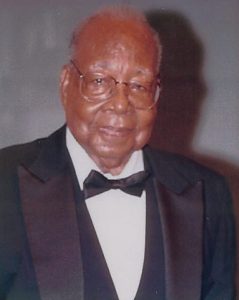Fletcher Franklin Jones, born in Covington County near the Rose Hill community, June 4, 1895, was the son of Henry Jones and Callie Roussea Jones. The family soon moved to Carter’s Old Mill which was located on the site of the present-day Opine community. In 1911 the family relocated to the Sasser’s Crossroads community. Mr. Jones would get up at 6 a.m. every morning and walk to his work at the Miller Brent Lumber Company in Poley. Work ended at 6 p.m. and he would walk back home. He was paid $3.00 a day. Mr. Jones often remarked that the “good old days” were not so good and Americans who never experienced these hard times didn’t know how good they had it.
In 1912, at the age of 17, Fletcher Jones married Sarah Comer. They had two sons, Percy and Henry Hubert. In 1919, the family moved to Opp. Some years later, at a very young age, his granddaughter, Margaret Louise Jones, came to live with him and his wife. Mr. Jones worked at Benton Mercantile Company and literally helped to build Opp by laying bricks for the First National Bank and many other buildings. In 1955 he began working at the bank that he helped to build and worked there until his retirement in 1992 at the age of 97.
In 1936, Mr. Jones married Alice Leslie. She had two children, Nelacy Bailey and Corine Bailey from a previous marriage and the two families became one. Fletcher Jones loved young people and wanted them to become the very best they could be. He was well known and well respected in both the black and white communities. Although he was unable to go to school for more than a few years, Fletcher Jones believed in education, and this was his passion. During these years the schools were segregated and the black school in Opp only went to the sixth grade. Mr. Jones’ reputation was such that he was appointed by Opp City School superintendent and principal, Dr. H.N. Lee to look for and hire teachers for the black school in
Opp. In 1938, Fletcher Jones view that black students needed more than a sixth-grade education grew to the point that he felt he must make this a reality. He went to Principal Lee asking that the black school be enlarged and more teachers hired. He was told that the city could not afford the expansion. Fletcher Jones was undaunted and went to the county superintendent, E. B. Norton, whom he had known when his family lived near Rose Hill. E. B. Norton agreed that if the city would turn the black school over to the county, the county would run the school and transport the black students by bus to Andalusia to the county high school. But there was one big stumbling block. The county did not have the money to buy buses. The county was persuaded to furnish the body of the bus if someone would buy the truck. They also agreed to pay $90.00 per month for operating expenses over a 105-mile weekly route. Fletcher Jones said that he would buy the truck. The contract was signed, and a wonderful new opportunity was opened up for the black students in Opp. Mr. Jones lost $300.00 his first year but did not give up. He operated the transportation system until 1952.
Fletcher Jones was a faithful member of Nazareth Baptist Church where he served as a head of the Deacon Board for 50 years, president of the Sunday School and BTU Congress, vice-president of the Laymen’s Department of the Southeast District State Baptist Convention, Secretary of the Southwest District Association and Superintendent of the Sunday School. When the church needed to be remodeled but had no money, Fletcher Jones had the materials charged to him. When they needed more parking space, he donated a lot. He kept the church yard cleaned and the grass cut for 55 years.
Fletcher Franklin Jones always told his family, “If you see a need, fill it if you can”. His life was the embodiment of that motto. He died at his home in Opp on February 25, 1995. He was 99 years old. He was inducted into the Hall of Fame in 2012.

